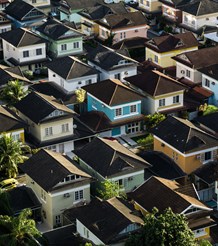
President Xi Vows To Grow Rental Market Amid Outcry On Chinese Home Prices
Everybody seems intent on wanting a piece of the property action: developers, local governments and banks all surge to the real estate business. As a result, property prices have soared. Now the president has entered into the world's biggest property gamble - an experiment that aims to tame runaway real estate prices. His new housing model was announced in a milestone Communist Party Congress speech in October last year, in which he emphasized renting rather than individual home ownership. Traditionally, families still help first-born sons to get on the housing ladder so they can marry and start a family of their own.
His speech was intended to put people off buying...but ended up encouraging a flurry of activity among developers, local governments and banks - even the world's biggest stock exchange. It was seen as the first step in a package of programs that includes a long-awaited property tax and will be rolled out over several years to get to grips with one of the world's most untamed real estate markets.
Speaking to Bloomberg, Shen Jianguang, chief Asia economist at Mizuho Securities Asia Ltd. in Hong Kong said: "China’s property market is on the brink of tremendous change. The push for rental properties shows a new model is starting to emerge."
Many critics have said the country's property boom is fuelling inequality. Xi Jinping is now using his power to find a solution to a problem that has been plaguing policy makers around the world, namely that of spiralling housing prices in major urban areas that have fuelled increases in inequality and discontent.
He seems to aim at a new market model, something between the capitalist feeding frenzy that caused residential real estate prices in Beijing and Shanghai to rise ever higher, and the Communist system where homes were allocated to employees by work units.
Deng Yongheng, of the University of Wisconsin, said that establishing a lively rental market will help to lessen the risks from "irrational" housing prices. The university was involved in carrying out a study that revealed a 1,538 percent gain in land prices in Beijing from 2004 to 2016.
Across China, large rental complexes are currently being completed, are under construction or in planning. Funding is being made available without problem. These changes may well alter developers' businesses, consolidate the industry, "shake up government revenue" and aid more Chinese citizens to find a decent home. Many may become, like their German counterparts, renters for life.
At least in theory, a lively rental market adds to housing stock supply and prevents prices from going even higher after a 13-year boom. The old residential real estate model in which home ownership was at the forefront encouraged "a lot of speculation and crazy price gains - and that model is coming to an end," explained Rosealea Yao, an analyst at Gavekal Dragonomics in Beijing, when speaking to Bloomberg in January this year.
Government backing could drive annual rental payments in the size of China's rental market to 4.2 trillion Yuan or $658 billion by 2030, nearly half of total home sales in 2017, according to estimates from Orient Securities Co.
The Chinese government has tried practically everything else to tame the wild housing market. Unfortunately, housing has been responsible for some of the country's biggest boom and bust stories. Many local investors do not trust the Chinese stock markets and as they are not allowed by Beijing to move their wealth to other countries, they simply invest in housing, fuelling price hikes everywhere. Mortgage lending has increased dramatically over the past two years, adding to the potential for financial trouble in the Chinese real estate sector.


